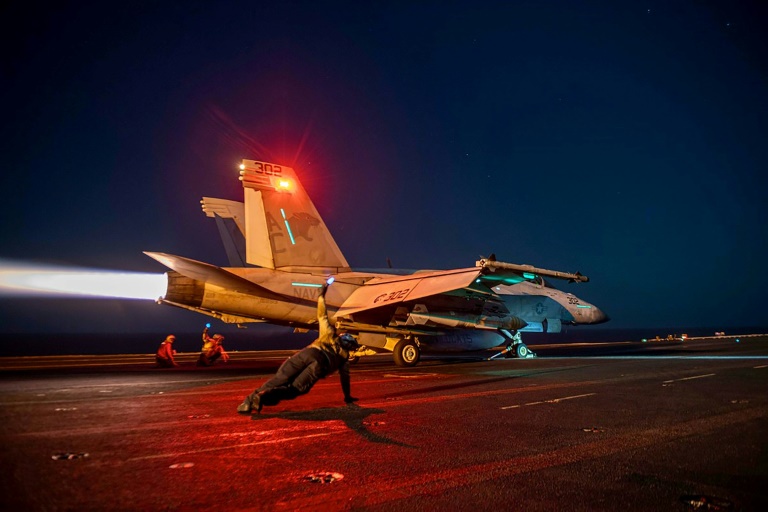US, UK launch new wave of strikes against Yemen’s Huthis

This image released by US Central Command on February 24, 2024 shows a fighter plane launching from the deck of the USS Eisenhower aircraft carrier in the Red Sea during operations against Huthi targets
Washington – American and British forces carried out a fresh wave of strikes Saturday against 18 Huthi targets in Yemen, following weeks of unrelenting attacks on Red Sea shipping by the Iran-backed rebels.
The strikes “specifically targeted 18 Huthi targets across eight locations in Yemen” including weapons storage facilities, attack drones, air defense systems, radars, and a helicopter, a joint statement said.
It was co-signed by Australia, Bahrain, Denmark, Canada, the Netherlands and New Zealand, who gave unspecified “support” to the new round of strikes, the second this month and fourth since the rebels began their attacks on ships in the region.
“The Huthis’ now more than 45 attacks on commercial and naval vessels since mid-November constitute a threat to the global economy, as well as regional security and stability, and demand an international response,” the statement said.
Huthi-run Al-Masirah television reported “a series of raids on the capital Sanaa,” while AFP correspondents in the rebel-controlled city in western Yemen said they heard several loud bangs.
“The United States will not hesitate to take action, as needed, to defend lives and the free flow of commerce in one of the world’s most critical waterways,” Pentagon chief Lloyd Austin said in a separate statement after the strikes.
“We will continue to make clear to the Huthis that they will bear the consequences if they do not stop their illegal attacks, which harm Middle Eastern economies, cause environmental damage, and disrupt the delivery of humanitarian aid to Yemen and other countries.”
Huthi military spokesman Yahya Saree was defiant, vowing in a social media statement that the rebels would “confront the American-British escalation with more qualitative military operations against all hostile targets in the Red and Arab Seas.”
The UK Ministry of Defence said four Royal Air Force Typhoon FGR4s targeted “several very long-range drones, used by the Houthis for both reconnaissance and attack missions,” on Saturday, at a site north-east of Sanaa.
Saturday’s operation comes after several merchant vessels were struck this week in the region, including the fertilizer-filled Rubymar, whose crew had to abandon ship after it was hit Sunday and began taking on water.
Apart from the joint operations with Britain, the United States has also carried out unilateral strikes against Huthi positions and weaponry in Yemen, and downed dozens of missiles and drones in the Red Sea.
– Anti-ship missile downed –
Earlier on Saturday, US Central Command (CENTCOM) announced that an American Navy ship had shot down an anti-ship ballistic missile “launched into the Gulf of Aden from Iranian-backed Huthi controlled areas of Yemen.”
The missile “was likely targeting MV Torm Thor, a US-Flagged, owned, and operated chemical/oil tanker,” CENTCOM said on X, formerly Twitter.
US forces on Friday also shot down three attack drones near commercial ships in the Red Sea and destroyed seven anti-ship cruise missiles on land, CENTCOM said.
The Huthis say they are targeting Israel-linked vessels in support of Palestinians in Gaza, which has been ravaged by the Israel-Hamas war.
Following previous US and UK strikes, the Huthis declared American and British interests to be legitimate targets as well.
The Huthis will “persist in upholding their religious, moral and humanitarian duties towards the Palestinian people, and their military operations will not stop unless the aggression stops and the siege on the Palestinian people in the Gaza Strip is lifted,” military spokesman Saree said.
Anger over Israel’s devastating campaign in Gaza — which began after an unprecedented Hamas attack on October 7 — has grown across the Middle East, stoking violence involving Iran-backed groups in Lebanon, Iraq, Syria and Yemen.
